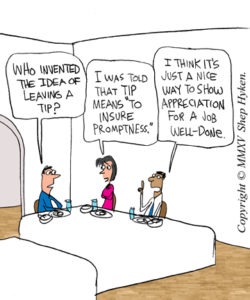Customer Experience
Important: This article is not about tipping etiquette. This is an observation of a very nice hotel that left a bad impression. So, hang in there with me. There’s a point at the end of the story.
Here in the United States we’re expected to tip people for good service. Standard gratuity for a server at a restaurant is 15%. If the server does a great job, many times people tip 20%. At hotels we tip the doorman who gets you a cab, the bellman who carries your bags to your room, and others who help you along the way. So, what about the housekeeping staff? These are the people that make your bed, clean your room, and make sure you have clean towels. And when do you do tip? At the beginning of the stay? At the end? Every Day?
Some have said that TIP means “To Insure Promptness (or Performance)” however my research indicates that this may be a myth.
Still, I usually tip the hotel’s housekeeping staff a few dollars a day. Recently I stayed at a nice hotel and was upgraded to a beautiful suite. On the nightstand there was an envelope that had instructions on tipping the housekeeper. I first thought this was a bit presumptuous, but I went with it. I was staying for three nights so I put a twenty dollar bill in the envelope and wrote a note that said, “Thank you for taking care of me during my stay at your hotel. Shep H.” The next day I came back to the room and noticed that the envelope had been taken and there was a new, fresh white envelope, waiting for another tip. What was missing was a note that said, “Thank you.” At least something that indicated the housekeeper got and appreciated the tip.
At checkout the front desk clerk asked me how my stay was. I told her great, but I did have one issue. She seemed surprised when I told her my story. Then she said that maybe the housekeeper only spoke Spanish and didn’t know English, which is why she didn’t write a note. Well, I’ve stayed in hotels that weren’t nearly as nice, and have almost always received some type of acknowledgment – even from housekeepers who didn’t speak English. A simple note, even in Spanish, with just the word “gracias” would have been appreciated.
There are several lessons that came out of this experience.
- Don’t take customers for granted. Be it a tip or just a customer who chooses to do business with you, don’t be presumptuous. Expecting someone to buy – or tip – you is in bad form. Earning the customer’s business – or tip – is the right way to do business.
- When someone does something nice for you, always say, “Thank you.” If you spent money at a business and their people didn’t say thank you or express appreciation, you would notice. As a result, the next time you might consider doing business with someone else – someone who might make you feel more appreciated.
- And, this lesson has an interesting by-product of the experience. Notice how the front desk clerk made an excuse for her housekeeper. When a comment like the one I made, which could have been construed as a complaint, is presented to you, take ownership rather than make excuses. She could simply have said, “I’m sorry. I’ll follow up on this.” That and a big smile would have gone a long way to making me feel as if I was heard.
By the way, if you are interested in tipping your housekeeper the next time you take a trip, consider that, according to Michael Lynn, a professor at the Cornell University School of Hotel Administration, about 30% of U.S. hotel guests leave tips for hotel housekeepers. And according to Emily Post, the typical tip is one or two dollars per person, per night. A little more for the fancier hotels. Be sure to leave a note with the money to indicate it is for housekeeping – unless they provide the envelope.




